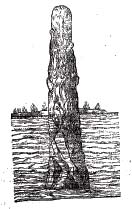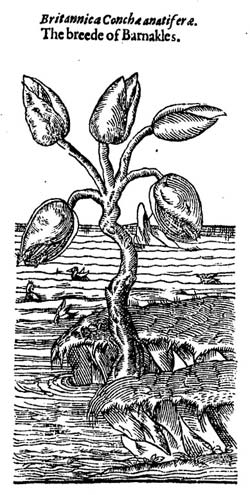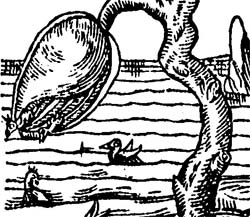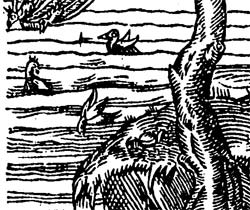

SPRING QUARTER, 2006
Department of History
University of California, Irvine
Instructor: Dr. Barbara J. Becker
|
Week 3. Generation excerpts from
|
Chap. 166. Of the Stonie Woode, or woode made Stones.
*The description.
Among the wonders of England this is one of great admiration, and contrarie unto mans reason and capacitie, that there shoulde be a kind of woode alterable into the hardnes of a stone called Stonie woode, or rather a kinde of water, which hardneth woode and other things, into the nature and matter of stones. But we know that the works of God are woonderfull, if we do but narrowly search the least of them, which we daily beholde; much more if we turne our eies vpon those that are seldome seene, and knowne but of a fewe, and that of such as haue painfully trauelled in the secrets of nature.
 |
|
Stonie wood. |
Also my selfe being at Rougby (about such time as our fantasticke people did with great concourse and multitudes, repaire and run headlong vnto the sacred Wels of Newnam regu, in the edge of Warwickshire, as vnto the water of life, which could cure all diseases) I went from thence vnto these Wels, where I founde growing ouer the same a faire Ash tree, whose boughes did hang ouer the spring of water, whereof some that were seare and rotten, and some that of purpose were broken off, fell into the water, & were all turned into stones. Of these boughes or parts of the tree, I brought vnto London, which when I had broken in peeces, therein might be seene that the pith and all the rest was turned into stones; yea many buds and flowrings of the tree falling into the saide water, were also turned into hard stones, still retaining the same shape & fashion that they were of before they were in the water. I doubt not but if this water were prooued about the hardning of some kinde of confections Phisicall, for the preservation of them, or other speciall ends, it would offer greater occasion of admiration for the health and benefite of mankinde, then it doth about such things as already haue beene experimented, tending to very little purpose.
Chap. 167. Of the Goose tree, Barnackle tree, or the tree bearing Geese.
 |
Hauing trauelled from the Grasses growing in the bottome of the fenny waters, the woods, and mountaines, euen vnto Libanus it selfe; and also the sea, and bowels of the same: we are arriued to the end of our Historie, thinking it not impertinent to the conclusion of the same, to end with one of the maruels of this land (we may say of the world.) The Historie whereof to set foorth according to the woorthines and raritie thereof, woulde not onely require a large and peculiar volume, but also a deeper search into the bowels of nature, then my intended purpose will suffer me to wade into, my insufficiencie also considered; leauing the historie thereof rough hewen, vnto some excellent men, learned in the secrets of nature, to be both fined and refined: in the meane space take it as it falleth out, the naked and bare truth, though unpolished.
There are founde in the north parts of Scotland, & the Ilands adiacent, called Orchades [Orkney Islands], certaine trees, whereon doe growe certaine shell fishes, of a white colour tending to russet; wherein are conteined little liuing creatures: which shels in time of maturitie doe open, and out of them grow those little liuing things; which falling into the water, doe become foules, whom we call Barnakles, in the north of England Brant Geese, and in Lancashire tree Geese: but the other that do fall vpon the land, perish and come to nothing: thus much by the writings of others, and also from the mouths of people of those parts, which may very well accord with truth. But what our eies haue seene, and hands haue touched, we shall declare.
There is a small Ilande in Lancashire called the Pile of Foulders [Peel Island], wherein are found the broken peeces of old and brused ships, some whereof haue beene cast thither by shipwracke, and also the trunks or bodies with the branches of old and rotten trees, cast vp there likewise: wheron is found a certain spume or froth, that in time breedeth vnto certaine shels, in shape like those of the musckle, but sharper pointed...
 |
|
A goose emerges from its barnacle shell. |
wherein is conteined a thing in some like a lace of silke finely wouen, as it were togither...; one ende whereof is fastned vnto the inside of the shell, euen as the fish of Oisters and Muskles are; the other ende is made fast vnto the belly of a rude masse or lumpe, which in time commeth to the shape & forme of a Bird: when it is perfectly formed, the shel gapeth open, & the first thing that appeereth is the foresaid lace or string; next come the legs of the Birde hanging out; and as it groweth greater, it openeth the shell by degrees, till at length it is all come foorth, and hangeth onely by the bill; in short space after it commeth to full maturitie, and falleth into the sea, where it gathereth feathers, and groweth to a foule, bigger then a Mallard, and lesser then a Goose; hauing blacke legs and bill or beake, and feathers blacke and white, spotted in such maner as is our Magge-Pie...; which place aforesaide, and all those parts adioining, do so much abound therewith, that one of the best is bought for three pence: for the truth heerof, if any doubt, may it please them to repaire vnto me, and I shall satisfie them by the testimonie of good witnesses.
 |
|
Birds that fall into the water swim away; those that fall onto the land do not survive. |
I dare not absolutely auouch euery circumstance of the first part of this Historie concerning the tree that beareth those buds aforesaide, but will leaue it to a further consideration: howbeit that which I haue seene with mine eies, and handled with mine handes, I dare confidently auouch, and boldly put downe for veritie. Nowe if any will object, that this tree which I sawe might be one of those before mentioned, which either by the waues of the sea, or some violent winde, had beene ouerturned, as many other trees are; or that any trees falling into those seas about the Orchades, will of themselues beare the like foules, by reason of those seas and waters, these being so probable coniectures, and likely to be true, I may not without preiudice gainsaie, or indeuor to confute.
*The place.
The bordes and rotten plankes whereon are found these shels, wherein is bred the Barnakle, are taken vp in a small Iland adioining to Lancashire, halfe a mile from the maine land, called the Pile of Foulders.
*The time.
They spawne as it were in March and Aprill; the Geese are formed in Maie and Iune, and come to fulnesse of feathers in the moneth after. And thus hauing through Gods assistance, discoursed somewhat at large of Grasses, Herbes, Shrubs, Trees, Mosses, and certaine excrescences of the earth, with other things moe incident to the Historie thereof, we conclude and ende our present volume, with this wounder of England. For which Gods name be euer honored and praised.
The end of the third and last Booke
of the Historie of
Plants.
![]()

|